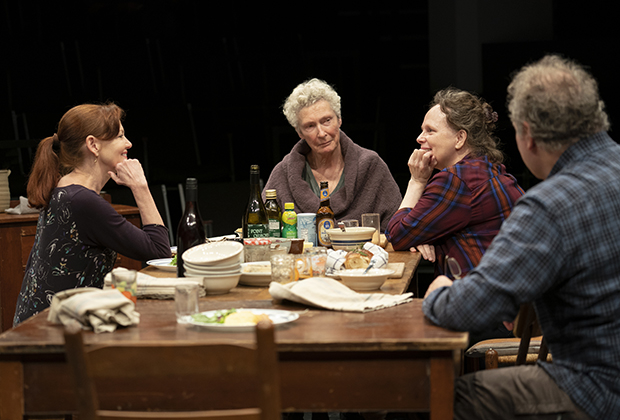Richard Nelson Returns to Rhinebeck With Depressing Play The Michaels

(© Joan Marcus)
Theater and dance, more than any other creative art form, are ephemeral by nature. They mimic life: Works are born in rehearsal, live in performance, and die when the curtain falls. They live on in our collective memories, but the experience of each performance is, by its nature, fleeting.
Playwright and director Richard Nelson has always been drawn to the intrinsic impermanence of the medium, and he continues his exploration of artistic mortality in The Michaels: Conversations in Difficult Times at the Public Theater. The Michaels is the latest in his now eight-play Rhinebeck Panorama cycle, which previously introduced audiences to the Apple and Gabriel families. The members of each group are white, upper-middle-class Americans who aren't particularly special, and they gather in their wealthy Hudson Valley town over dinner to discuss life, politics, and a world that's rapidly changing before their eyes.
In this one, we're introduced to Rose Michael (Brenda Wehle), a modern choreographer whose heyday was the dance explosion of the '70s, and who has recently been diagnosed with stage IV ovarian cancer. Rose is being looked after by her new partner Kate (Maryann Plunkett), a retired history teacher, though Rose's former husband David (Jay O. Sanders) and his wife Sally (Rita Wolf), one of Rose's longtime dancers, live on the same property.
What transpires in the kitchen on Sunday, October 27, 2019, is a discussion of death, particularly that of Rose's physical form, but also, a certain kind of life. With the help of Sally and fellow former company member Irenie (Haviland Morris), Rose and David's daughter Lucy (Charlotte Bydwell) and her cousin May (Matilda Sakamoto) are readying themselves for a local retrospective of Rose's work where they will dance three of Rose's best-known pieces, effectively giving them rebirth.
While the other works in Nelson's Rhinebeck series found certain characters willing to raise their voices in argument, The Michaels is perhaps the quietest of all. Even with a delicate constellation of microphones hanging from the rafters (an image by sound designer Jennifer Tipton and set designer Jason Ardizzone-West that has dotted each of the seven plays), it's hard to hear everything, and it makes this one feel particularly eavesdroppy.
Trouble is, we're not eavesdropping on all that much. In The Apple Family Plays and The Gabriels, drama was born out of familial strife and political disagreements. (I'll never forget the knot in my stomach during the last Gabriels play, which was set during and opened on election night 2016.)
In The Michaels, everyone feels so removed that it's almost like they've never actually met. It doesn't help that for once, the company is a mixed bag, a stark contrast to the tight-knit families Nelson built for the other works. Wehle's imperiousness is perfect, and with a curly mop of white hair, she gives off a Twyla Tharp vibe. Real-life married couple Plunkett and Sanders, who've been in all of the Rhinebeck shows, are as routinely excellent as ever. No one else seems to click.
Similarly, the subject matter itself is visibly resisting being boxed into the kitchen-set Rhinebeck cycle. As Lucy and May dodge tables and chairs and people to show Rose what they've been working on (the dances are based on the work of Dan Wagoner and adapted here by Sara Rudner and Gwyneth Jones), you can practically hear the play scream that it wants to take place almost anywhere else.
That scream is the loudest sound we hear before the play fades into the dark.










